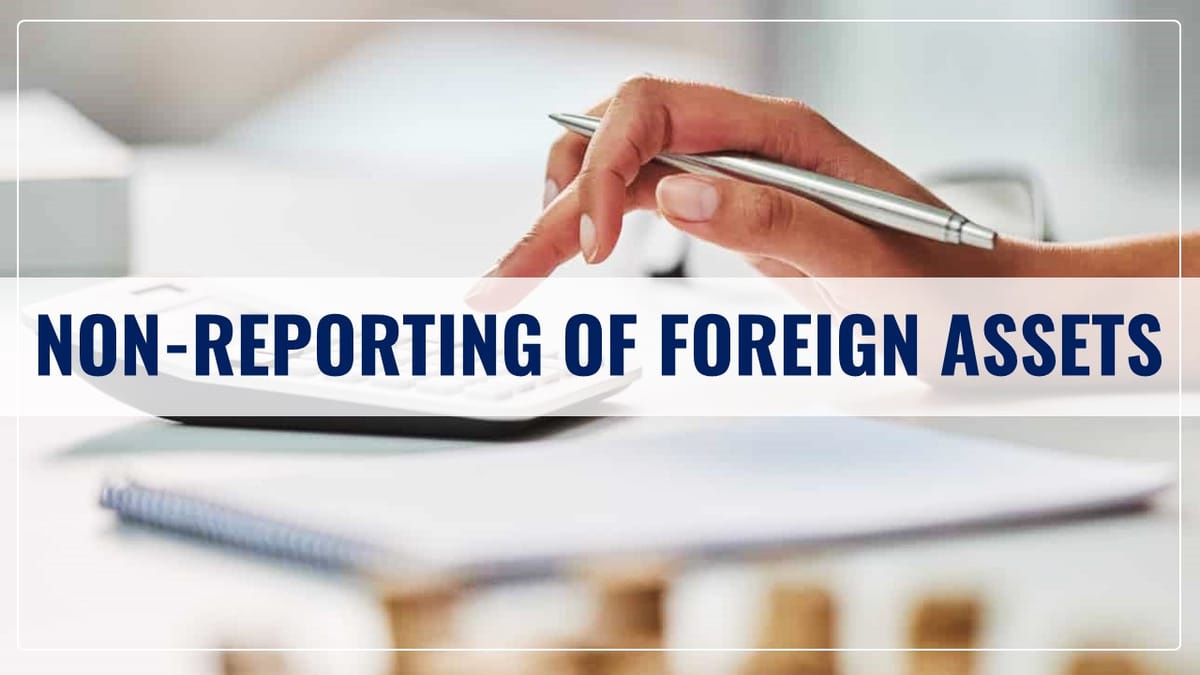The Mumbai Income Tax Appellate Tribunal has recently upheld the penalty imposed on assessees for failing to report foreign assets in schedule FA of their income tax returns (ITR).
Reetu | Oct 6, 2023 |

Non-reporting of Foreign Assets highlight after adverse ITAT Orders
The Mumbai Income Tax Appellate Tribunal has recently upheld the penalty imposed on assessees for failing to report foreign assets in schedule FA of their income tax returns (ITR). This is a departure from previous rulings that favoured assessees.
Schedule FA requires all resident taxpayers to report their foreign assets on their ITR. Section 43 of the Black Money Act (BMA) imposes penalties for failing to disclose foreign asset details under Schedule FA in a resident’s or ordinary resident’s original, belated, or revised return of income.
In the recent Shobha Thawani case, the assessee used a liberalised remittance scheme under the Foreign Exchange Management Act to invest in foreign financial assets from her Indian bank account during the financial year 2014-15. The aforementioned foreign asset was a general investment in “Global Dynamic Opportunity Fund” in which the assessee owns 40% of the shares.
Under section 43 of the BMA, the assessing officer (AO) issued a show cause notice and levied a penalty of 10 lakh for each of the assessment years 2016-17 to 2018-19. The assessee claimed that the foreign assets were properly disclosed in the AY2019-20 return and that the error was not intentional.
In the case of Nirmal Bhanwarlal Jain, the assessee was penalised for failing to report investments made in his children’s names in Schedule FA.
According to experts, a penalty may be imposed if the AO discovers that the taxpayer has assets abroad that are not explainable.
“In Thawani’s case, the source of acquisition of such assets, as well as the full income from such assets, are disclosed. If foreign assets are not disclosed in Schedule FA of the return of income, it is only a technical default. In such cases, the officer should use his discretion rather than imposing a fixed penalty,” according to an international tax expert.
Penalty should be proportionate to the cause of action, and if imposed for non-disclosure in the first year, it should not be repeated in subsequent years, he added.
In the case of Leena Gandhi Tiwari, the husband failed to declare his assets, and the penalty was imposed in his name. Tiwari was only a signatory to the joint accounts, but the IT officer imposed a penalty. However, in March 2022, the Mumbai ITAT overturned this levy on the grounds that it was merely a technical error on Tiwari’s part.
This principle established by the ITAT has been followed in subsequent decisions, such as Ocean Diving Centre vs. Commissioner of Income Tax and Tejal Ashish Mehta vs. Additional CIT.
According to Harshal Bhuta, Partner, PR Bhuta & Co., BMA provisions relating to information disclosure are intended to assist the tax department in conducting investigation and analysis using AI tools to unearth undisclosed foreign assets and income. The AO, however, should refrain from levying the penalty in cases where the information disclosure omission qualifies as a technical or venial breach or where there are bona fide reasons for such breach, he said, citing the principles laid out by the Supreme Court in the case of Hindustan Steel versus State of Orissa in 1972.
The legislation should also include a mechanism that allows a taxpayer to suo-moto correct a non-disclosure breach other than by filing a revised return, so that they can protect themselves from such harsh provisions once they realise the error, added Bhuta.
If an assessing officer wishes to levy a penalty under the BMA, Section 139(9) of the IT Act states that if the return is found to be defective, he must issue a show cause notice to the taxpayer within 15 days to cure the defect.
“Experience shows that officers do not follow the mandatory provision of issuing notice under Section 139(9) of the ITA and immediately levying penalty under the BMA.” That clearly violates the Supreme Court’s principles requiring the tax officer to assist the taxpayer in complying with the law,” said Ostwal.
The BMA does not require a separate return, and the Act relies on compliance with the IT Act.
In case of any Doubt regarding Membership you can mail us at [email protected]
Join Studycafe's WhatsApp Group or Telegram Channel for Latest Updates on Government Job, Sarkari Naukri, Private Jobs, Income Tax, GST, Companies Act, Judgements and CA, CS, ICWA, and MUCH MORE!"